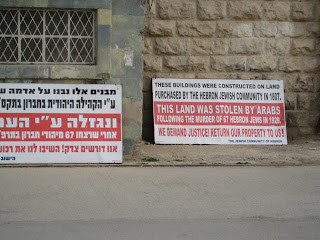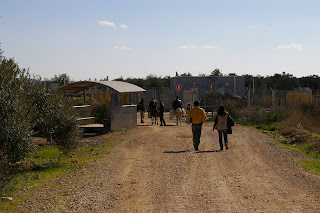 Monitoring the gate
Monitoring the gateToday, we started what we call our OCHA-week. We will be monitoring the agricultural gate by the village of
Deir al-Ghusun (gate 623) for seven days in a row.
When Israel built their so-called
'security fence' (from now on referred to as the Wall) in 2003, the farmers of Deir Al Ghusun and the surrounding area were cut off from their agricultural land. A major proportion of their fields are now in the
seam zone - the land between the Wall and the green line. Gate 623 is the only way for the farmers in Deir al-Ghusun to access their fields. But it is just open three times a day, for two and a half hours in total.
However, you cannot just go through. You need a permit. This is issued by the Israeli authority and is rather hard to obtain. In order to get one, you need to prove that you own land on the other side of the Wall. Even then, you might not get a permit. They usually issue one permit to one person in each family, regardless of the size of their fields. And in some cases, the person granted a permit happens to be the most unsuitable person in the family, like a child or an elderly person. In one family, they allegedly gave the permit to the blind brother.
Another example of how the Israeli authority is bending the rules, is by questioning the
lineage of inheritance. Land is registered to the name of the original owner, but after four generations, the ties to the original owner's name disappears as a result of how they name their children in Palestine. So, when people are unable to prove their ownership, the Israeli authority will not grant permits.
 "Morratryne" - Waiting for the gate to open
"Morratryne" - Waiting for the gate to open
For us, gate watching means that we have to get up at 4.30AM every morning to be at the gate before 6.00AM. There, we make sure the gate is opened on time and we monitor the soldiers' behaviour. And we count: men, women, children, tractors, donkeys and carts. Why? Because United Nations Office for the Coordination of Humanitarian Affairs (OCHA, hence OCHA-week) wants numbers on how many people actually pass the gate. Before the construction of the Wall, there used to be around 180 people working on the fields every day. Now there are about 60, mainly as a result of the permit system.
The permit system is intricate and arbitrary, and I could go on and on about the many injustices the Palestinian farmers face in order to reach the land that they legally own. Quite often, the farmers have to lift up their shirts and the bottom of their trousers, as well as have their body and belongings searched. Imagine being treated as a criminal every day on your way to work. It is beyond frustrating and humiliating.
I believe that Israel might be digging their own grave with their overtly security-centred policies. Palestinian antagonism against their country will only grow and it is the perfect environment for desperation and anger to breed. I feel it too. The whole thing makes you wanna throw rocks.
 Yad Vashem - Holocaust Museum
Yad Vashem - Holocaust Museum





























